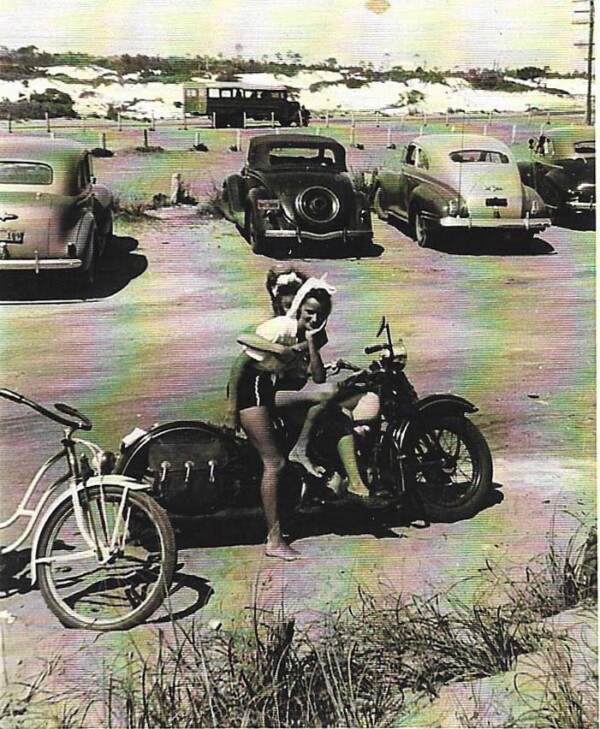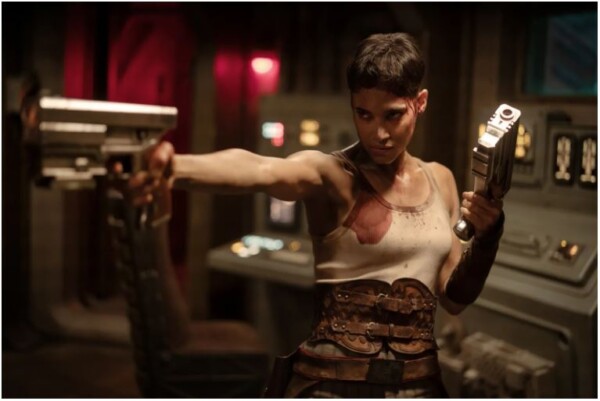Today is Mom’s birthday

Today is Mom’s birthday. She would have been 97 (and would have killed me for telling you that). Happy birthday, Mom!

“Rebel Moon – Part Two: The Scargiver” Starring Sofia Boutella as flabbergasting Kora; Djimon Hounsou as uninspiring Titus; Bae Doona as almost likeable Nemesis; Michiel Huisman as meek Gunnar; Staz Nair as the soppy prince Tarak, Ed Skrein as the only-good-enough-character-in-the-film Atticus Noble; and others. Directed by Zack Snyder. Two hours, 2 minutes. Rated PG-13. Streaming on Netflix.
Plot summary: More of mediocre and trope-filled “Rebel Moon – Part One: A Child of Fire” but 17 minutes longer. Rednecks fight an evil empire that can’t feed the soldiers it sallies to subdue rednecks.
Mladen’s grade: C+
Dels grade: D
Mladen’s take
This is an unauthorized review. That means it wasn’t approved by Del. He wanted me to review (and, someday, I will) a movie titled “This Is Not a Test.” Sheesh, Del, are you still afflicted by your memory of the Cuban Missile Crisis? Is that why I’m supposed the review “This Is Not a Test?” Because it’s a nuclear warhead Armageddon film and you’re worried that the Small Man in Moscow will trigger World War III via Ukraine that plunges all of us into Hobbes’s state of nature.
Anyway, let’s talk “Rebel Moon – Part Two: The Scargiver” recently launched on Netflix. Two is no better than One, which is to say all the principal characters, barring one, are bland at best and unlikeable at worst. Don’t care about Kora’s faux internal conflict. Don’t care about Titus’s guilt. Don’t care that Tarak is a nepo baby trying to redeem himself. Just. Don’t. Care. That’s a problem because Rebel Moon offers nothing by way of an original story or grand ideas.
Ready for some alien invasion action? Check out Mladen’s and Del’s review of “The Tomorrow War.”
If there’s nothing pathbreaking in a film, the only factor that can save it is a good script. Neither Rebel Moons have good scripts. Two is packed with the banal such as near-immortality to keep the bad guy going, i.e., resurrecting someone from the half-cell that was saved after they’ve been incinerated, blasted apart, depressurized, I don’t know, take your pick of demises. Other banalities abound, too. Stuff like peasants fighting to keep their simple lives, peasants organizing an effective armed resistance against the system’s behemoth power, Motherworld, with two days of combat training, and peasants harvesting a massive wheat fields in three days using scythes so that they have two days to get military training before the Man arrives with a dreadnought the size of a city and thousands of troops. And, how the hell is the Rebel Moon able to produce an atmosphere, lithosphere, and hydrosphere that sustains carbon-based life when, on the horizon, is a gas giant that should be either emitting extreme magnetic radiation from its core that sterilizes everything on the moon, or locks the moon tidally so that all you get is extreme heat without darkness on one half and extreme cold without light on the other.
The secret to enjoying Two for what it is, a second-rate “Star Wars” or “Starship Troopers,” is to pay attention to the film’s few merits.
There’s the sublime evilness of Atticus Noble, the soulless admiral in charge of the Motherland force trying to sack Rebel Moon and capture Kora, who has an alias that, when revealed, surprises or shocks no one in the village. Noble is fit. Noble has a good vocabulary. Noble, who is the opposite of the meaning of his surname, keeps his uniform tidy and his composure intact as he whacks peasants and beats the crap out of Kora. Hated to see him die.
Also noteworthy is the film’s score. The music is particularly effective during Two’s last 50 minutes. In fact, just skip to the last 50 minutes of the film to immerse yourself in the spectacular visual effects. The battle scenes are terrific. Watching automatic plasma fire in slow motion fracturing and melting structures again and again never became boring. The sound is top tier, too. Everything from the zip-bang of rifles to the blast of the big gun on the dreadnought enhanced the VFX.
If you watched One, you may as well watch Two. And, yes, prepare yourself to watch Three, which is on the way. Three promises to be the all-or-nothing showdown between the Dark Side of the For … ah, between the Saviors of the Peasants and the top Motherworld Bad Guy, whose name sounds like it was ripped off from the name of a genus of dinosaur.

Del’s take
After watching “Rebel Moon Part Two: The Scargiver,” I’d like to ask, who’s the more scarred – the movie’s viewpoint character or ME, after Mladen dragged my sorry ass back into that steaming pile of wookie poop. I’ll say this about Part Two – it earned an even lower score than Part One’s dreadful Rotten Tomatoes rating of 23, clocking in at a mere 15 percent. That’s almost as shitty as Truth Social’s stock price.
Check out Del’s review of “Avatar: The Way of the Water.”
Mladen and I reviewed Part One last December and what can I say? Part Two is just as awful. OK, let me back up. It’s maybe a smidge less awful because the audience isn’t forced to suffer through the painful backstory infodump that took place in Part One. See? There is a God.
Here’s what I wrote in my review of Part One. These observations remain painfully true of Part Two:
“Rebel Moon” is Star Wars Lite, if such a thing is possible. When I saw director Snyder’s remake of “Dawn of the Dead” I told myself, “Now here’s a guy who knows how to make a movie.” Unfortunately, Snyder is a guy who knows how to make one movie. “Rebel Moon” looks just like “Sucker Punch,” “300” and “Watchmen,” and despite the lofty ambitions, it’s surprisingly bereft of depth.
Let’s not even talk about things like tropes or archetypes – “Rebel Moon” is a bad copy of a bad copy, like that photocopy of the mysterious night shift worker’s ass that turned up on the Xerox machine one morning and now everybody’s passing it around the office.
Dialogue is, well, corny. And not just corny corny, but fanboy at the science fiction convention Dungeons & Dragons icebreaker corny. Characterization is practically non-existent – you’ve seen these people in dozens of movies over the years, starting with Akira Kurosawa’s “The Seven Samurai,” the same place Snyder got the plot. It would have been hilarious if he’d ripped off J.J. Abrams. Alas, the universe doesn’t have that ironic a sense of humor. FX are not great, either. I should think $166 million would buy you a more realistic-looking spaceship or future city.
It’s all a gussied-up, overhyped pile of same-old, same-old, and I’ll be honest – it actually offends me. The science fiction genre – at least the printed-on-paper part of the genre – has thousands of really terrific stories waiting to be told. Why waste $166 million on this retread?
Are you getting the idea I really hated this movie?
I did embrace one aspect of the Rebel Moon universe – I bought two bags of Rebel Moon popcorn, but only because Walmart had them marked down to $2 apiece. And let me say, even the popcorn was crappy – chewy and stale, with lots of tooth-breaking unpopped kernels. If you want a really good bag of movie-style popcorn I recommend the AMC brand. It’s awesome. Just be sure to heat it up in the microwave for 30 seconds.
As Mladen, in a rare moment of cognitive awareness, pointed out, there actually may be a Rebel Moon Part 3. I’m telling you right now if he tries to make me watch that crap I’ll retaliate with lots of gay romance movies and a doc about the continuing evolution of the band Duran Duran. By the way, did you know they got that name from an old Jane Fonda movie, “Barbarella”? Yeah. I saw “Barbarella” at a drive-in in the early ’70s. Drunk, of course, because that’s the only way you can sit through a showing of “Barbarella.”
I give Part Two a D. It’s a goulash of clichés and horrible dialogue, and I’m angry Hollywood thinks I’m stupid enough to want that.
Mladen Rudman is a former journalist and technical writer. Del Stone Jr. is a former journalist and writer.

Image courtesy of Kharsohtun by way of Creative Commons.
Better living through technology? Sure, when it works.
But more and more I see technology becoming a dehumanizing influence on our lives, requiring that we spend more and more of our discretionary time on meeting the demands of the digital beast, abetted by a corporate mentality that favors money over all else.
A month ago I noticed my mobile phone bill had gone up by $5. I called the company to ask why and was given every answer but the real one – because they wanted more money. But they offered to switch me to a different plan, one that would do away with my ability to use my phone as a hotspot but would cost $10 a month less. I told them to do it.
Cut to yesterday. I receive a text message that says the mobile phone service provider is charging X number of dollars to my credit card. The amount is the same as the previous month.
So I spend a big chunk of this morning getting to the bottom of the problem, which appears to be that my new plan didn’t “take,” whatever that means.
This comes on the heel of a slew of automated text messages from medical entities wanting me to pay my bills – in one case I had already paid the bill and in the other, it’s set up to automatically bill to my credit card. And let’s not talk about the $5,000 error made by the hospital, which has yet to be resolved.
Technology is fine. But in the hands of corporations that don’t give a damn about anything except money, it has become a thing of evil. It has two imperatives: the alleged convenience it provides to us, the customer, which is debatable; and second, the benefit nobody talks about – reduced corporate costs, i.e., higher profits.
The corporate scramble for lower costs and higher profits has cheapened all our lives. A significant portion of the inflation we see today is the result of corporate profiteering. Their cost-cutting measures, with the transfer of work to the customer, have made our lives more stressful and less rewarding, especially at the hands of a quixotic technology base.
Orwell tells us that government is Big Brother. No. George got it wrong. Corporate America is Big Brother. Government is only the Drunk Uncle.
About the author:
Del Stone Jr. is a professional fiction writer. He is known primarily for his work in the contemporary dark fiction field, but has also published science fiction and contemporary fantasy. Stone’s stories, poetry and scripts have appeared in publications such as Amazing Stories, Eldritch Tales, and Bantam-Spectra’s Full Spectrum. His short fiction has been published in The Year’s Best Horror Stories XXII; Alfred Hitchcock’s Mystery Magazine; the Pocket Books anthology More Phobias; the Barnes & Noble anthologies 100 Wicked Little Witch Stories, Horrors! 365 Scary Stories, and 100 Astounding Little Alien Stories; the HWA anthology Psychos; and other short fiction venues, like Blood Muse, Live Without a Net, Zombiesque and Sex Macabre. Stone’s comic book debut was in the Clive Barker series of books, Hellraiser, published by Marvel/Epic and reprinted in The Best of Hellraiser anthology. He has also published stories in Penthouse Comix, and worked with artist Dave Dorman on many projects, including the illustrated novella “Roadkill,” a short story for the Andrew Vachss anthology Underground from Dark Horse, an ashcan titled “December” for Hero Illustrated, and several of Dorman’s Wasted Lands novellas and comics, such as Rail from Image and “The Uninvited.” Stone’s novel, Dead Heat, won the 1996 International Horror Guild’s award for best first novel and was a runner-up for the Bram Stoker Award. Stone has also been a finalist for the IHG award for short fiction, the British Fantasy Award for best novella, and a semifinalist for the Nebula and Writers of the Future awards. His stories have appeared in anthologies that have won the Bram Stoker Award and the World Fantasy Award. Two of his works were optioned for film, the novella “Black Tide” and short story “Crisis Line.”
Stone recently retired after a 41-year career in journalism. He won numerous awards for his work, and in 1986 was named Florida’s best columnist in his circulation division by the Florida Society of Newspaper Editors. In 2001 he received an honorable mention from the National Lesbian and Gay Journalists Association for his essay “When Freedom of Speech Ends” and in 2003 he was voted Best of the Best in the category of columnists by Emerald Coast Magazine. He participated in book signings and awareness campaigns, and was a guest on local television and radio programs.
As an addendum, Stone is single, kills tomatoes and morning glories with ruthless efficiency, once tied the stem of a cocktail cherry in a knot with his tongue, and carries a permanent scar on his chest after having been shot with a paintball gun. He’s in his 60s as of this writing but doesn’t look a day over 94.
Contact Del at [email protected]. He is also on Facebook, twitter, Pinterest, tumblr, TikTok, Ello and Instagram. Visit his website at delstonejr.com .